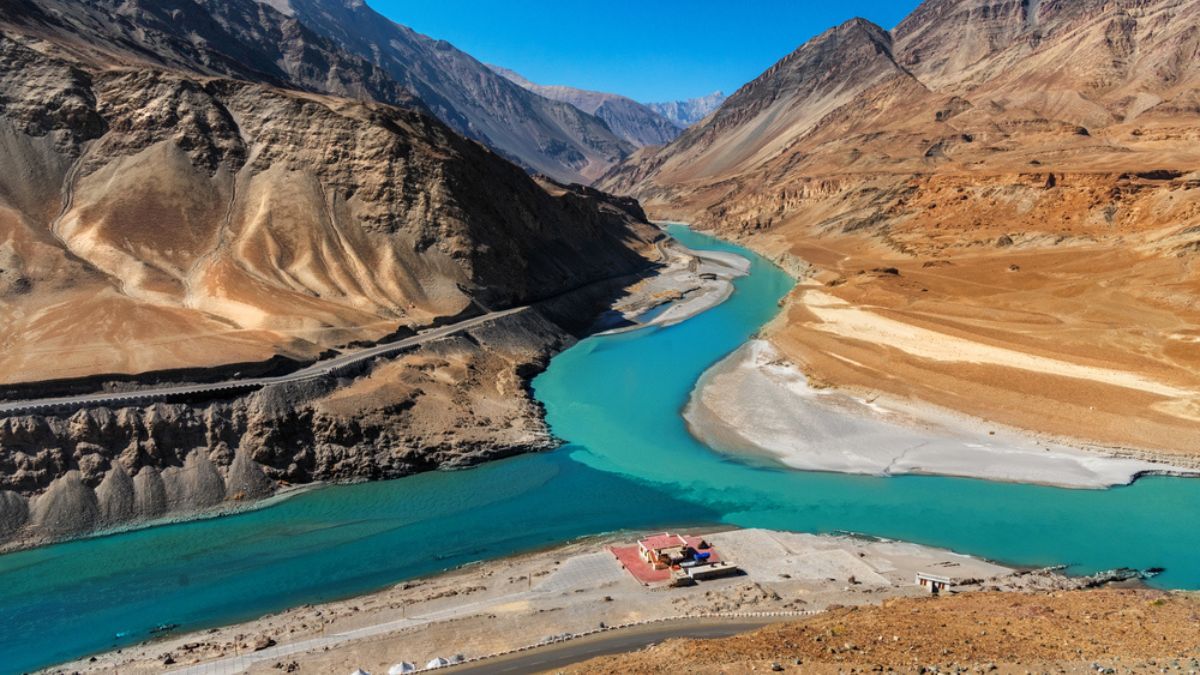Can India 'stop the flow' of water by axing the Indus Waters Treaty? Pakistani experts say no
 The gold deposit in Indus river in Pakistan is said to have originated from the Himalayas. This photo shows the confluence of the Indus and Zanskar rivers at Sangam, in Nimmu, Ladakh | Shutterstock
The gold deposit in Indus river in Pakistan is said to have originated from the Himalayas. This photo shows the confluence of the Indus and Zanskar rivers at Sangam, in Nimmu, Ladakh | Shutterstock
Even as India announced the suspension of the Indus Waters Treaty, Pakistan retaliated to the move, stating any attempt by India to block water flow into Pakistan would be treated as an act of war. While many debate the aftermath of such a move on Pakistan's agriculture sector, many Pakistani experts have claimed that there is no way India can stop the flow of water towards Pakistan.
According to Hassaan F Khan, a Pakistani urban and environmental policy expert at US-based Tufts University, India cannot stop water flow into Pakistan. "Certainly not at the scale that would make a meaningful dent in flows during the high flow season," he claims in an opinion piece that appeared in the Karachi-based website Dawn.
He argues that the Indus, Jhelum, and Chenab are enormous rivers that carry tens of billions of cubic meters of water between May and September when the snow melts. Though India has some upstream infrastructure on these rivers, including the Baglihar and Kishanganga dams, none were designed to hold back these kinds of volumes.
Khan claims that the Baglihar and Kishanganga, being run-of-the-river hydropower projects, have limited live storage and even if India were to coordinate releases across all its existing dams, all it can do is slightly shift the timing of flows.
Any attempt to disrupt the flow would cause flooding in its upstream regions as the overall volumes in the western rivers during this high-flow period are far too large, he added.
Abdul Basit, Pakistan’s former high commissioner to India between 2014 and 2017 also claims that the suspension of the treaty won't have much impact on Pakistan. He called the move largely "symbolic" due to India’s current lack of infrastructure to divert the western rivers. "At this stage, India cannot stop the flow of water," he told Karachi-based newspaper Express Tribune.
He also urged Pakistan to engage the World Bank, the treaty’s broker and guarantor, and to prepare a robust diplomatic and legal response. "India is not complying with its international obligations. So much for the world’s largest democracy and its aspirations for a UN Security Council seat" he added.
What happens during dry season?
That said, even Khan agrees that Pakistan will feel the pinch during dry seasons. When the flow of water across the basin is lower, the absence of the treaty can be felt. India developing new infrastructure in the region could be a threat, he agrees. This would give it greater control over the timing and volume of flows into Pakistan.
He argues that any large-scale dam or diversion project would take years to build. Khan argues that building such infrastructure in Kashmir is geologically challenging and the financial cost would be enormous. There would also be a great political risk.
"Pakistan has long said that any attempt by India to construct major new storage on the western rivers would be viewed as an act of war. In today’s age of satellites, these structures would not be invisible. They would be contested politically and possibly militarily," he argues.
World